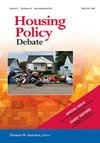亚利桑那州凤凰城的租房者,止赎危机:对贫困分散的影响
IF 2.8
3区 经济学
Q2 DEVELOPMENT STUDIES
引用次数: 1
摘要
最近美国丧失抵押品赎回权危机对联邦住房流动性计划的影响尚未得到很好的研究。本文探讨了危机对亚利桑那州凤凰城领取第8节代金券的低收入租房者的影响。我们发现(a) 8%的代金券持有者住在丧失抵押品赎回权的房屋中,(b)他们居住在相对富裕的社区,(c)大多数人最终在丧失抵押品赎回权后搬家。然而,那些在丧失抵押品赎回权后搬家的人在房地产市场上并没有明显处于劣势。这一意想不到的发现或许可以解释为,随着更富裕地区的抵押品赎回权被转换为租赁,新的住房机会向代金券持有人开放。总的来说,这项研究表明,止赎危机并没有对第8部分项目的目标产生负面影响,即在凤凰城分散贫困,甚至可能进一步推动这一目标,这一动态可能发生在其他以前繁荣和经济低迷的阳光地带地区。本文章由计算机程序翻译,如有差异,请以英文原文为准。
Section 8 Renters in the Phoenix, Arizona, Foreclosure Crisis: Implications for Poverty Deconcentration
Abstract How the recent U.S. foreclosure crisis affected federal housing mobility programs has not been well studied. This article explores the crisis’s impact on low-income renters receiving Section 8 vouchers in Phoenix, Arizona. We find that (a) 8% of voucher holders lived in homes that underwent foreclosure, (b) they were in comparably affluent neighborhoods, and (c) most eventually moved after foreclosure. Yet, those who moved after foreclosure were not overtly disadvantaged in the housing market. This unexpected finding may be explained by the opening up of new housing opportunities for voucher holders as foreclosures in more affluent areas were converted to rentals. Overall, this research suggests that the foreclosure crisis did not adversely affect the Section 8 program’s goal of deconcentrating poverty in Phoenix and may have even advanced it—a dynamic potentially occurring in other formerly booming and economically distressed Sunbelt regions.
求助全文
通过发布文献求助,成功后即可免费获取论文全文。
去求助
来源期刊

Housing Policy Debate
Multiple-
CiteScore
5.40
自引率
17.20%
发文量
68
期刊介绍:
Housing Policy Debate provides a venue for original research on U.S. housing policy. Subjects include affordable housing policy, fair housing policy, land use regulations influencing housing affordability, metropolitan development trends, and linkages among housing policy and energy, environmental, and transportation policy. Housing Policy Debate is published quarterly. Most issues feature a Forum section and an Articles section. The Forum, which highlights a current debate, features a central article and responding comments that represent a range of perspectives. All articles in the Forum and Articles sections undergo a double-blind peer review process.
 求助内容:
求助内容: 应助结果提醒方式:
应助结果提醒方式:


